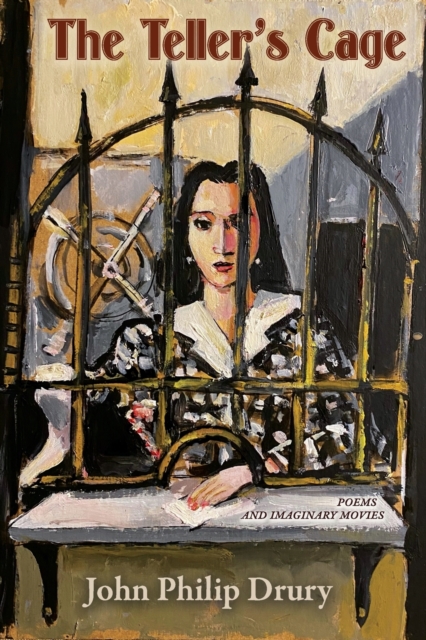The Teller's Cage: Poems and Imaginary Movies

The Teller's Cage: Poems and Imaginary Movies
PRAISE FOR THE TELLER'S CAGE:
In John Philip Drury's The Teller's Cage, in a richly textured tableau in the vein of the late Richard Howard's work, the speaker first reflects upon his younger life only to then, astonishingly, assume the perspective of his mother in a series of masterful persona poems. But most of all, one appreciates the ingeniously formal thrills of these very personal and alive poems. Drury's latest collection presents a uniquely visceral dream of recollection, into which you, dear reader, have been offered the gift of entrance. -Cate Marvin, author of Event Horizon
"We're still chameleons who can't help changing," writes John Philip Drury in this new collection that rings the changes on American speech and classical verse forms. Park, Echo, dark, deco: Drury masters the mysteries of rhyme with vernacular charm, both hard rhyme and-legion, moody, curmudgeon, embody-slant. He is also adept at incorporating history into his poems-close to home and further afield. It all fits naturally, thanks to his flexible style and broad-minded curiosity. Yet we sense the presiding spirit of the collection in his tender, deeply lived and felt poems of love and friendship. Drury's formal restlessness, his skill at poetic shapeshifting, offers us a "lexicon of things that morph," moving, in the final poem of each section, from poetry to cinematography as he scripts imaginary films for the theater of the mind. -Amit Majmudar, author of Twin A
"Imaginary movies," as John Philip Drury calls the poems in The Teller's Cage, just might be the best movies, at least in the hands of such a formally virtuosic auteur. With historical reach that takes in the brutality of seventeenth-century colonialism, the poet's mother's closeted love in the mid-twentieth century, and the devastating consequences of history in contemporary Venice, and with characters from a renaissance composer to John Waters, Drury's poems explore the imagination as our most essential way of facing facts. They defeat the easiness of nostalgia by insisting on the complexity of circumstances, as if the baroque
PRP: 136.09 Lei
Acesta este Prețul Recomandat de Producător. Prețul de vânzare al produsului este afișat mai jos.
122.48Lei
122.48Lei
136.09 LeiLivrare in 2-4 saptamani
Descrierea produsului
PRAISE FOR THE TELLER'S CAGE:
In John Philip Drury's The Teller's Cage, in a richly textured tableau in the vein of the late Richard Howard's work, the speaker first reflects upon his younger life only to then, astonishingly, assume the perspective of his mother in a series of masterful persona poems. But most of all, one appreciates the ingeniously formal thrills of these very personal and alive poems. Drury's latest collection presents a uniquely visceral dream of recollection, into which you, dear reader, have been offered the gift of entrance. -Cate Marvin, author of Event Horizon
"We're still chameleons who can't help changing," writes John Philip Drury in this new collection that rings the changes on American speech and classical verse forms. Park, Echo, dark, deco: Drury masters the mysteries of rhyme with vernacular charm, both hard rhyme and-legion, moody, curmudgeon, embody-slant. He is also adept at incorporating history into his poems-close to home and further afield. It all fits naturally, thanks to his flexible style and broad-minded curiosity. Yet we sense the presiding spirit of the collection in his tender, deeply lived and felt poems of love and friendship. Drury's formal restlessness, his skill at poetic shapeshifting, offers us a "lexicon of things that morph," moving, in the final poem of each section, from poetry to cinematography as he scripts imaginary films for the theater of the mind. -Amit Majmudar, author of Twin A
"Imaginary movies," as John Philip Drury calls the poems in The Teller's Cage, just might be the best movies, at least in the hands of such a formally virtuosic auteur. With historical reach that takes in the brutality of seventeenth-century colonialism, the poet's mother's closeted love in the mid-twentieth century, and the devastating consequences of history in contemporary Venice, and with characters from a renaissance composer to John Waters, Drury's poems explore the imagination as our most essential way of facing facts. They defeat the easiness of nostalgia by insisting on the complexity of circumstances, as if the baroque
Detaliile produsului










